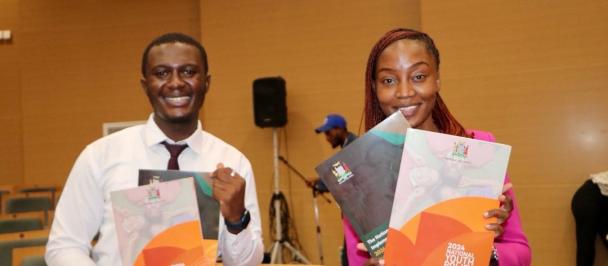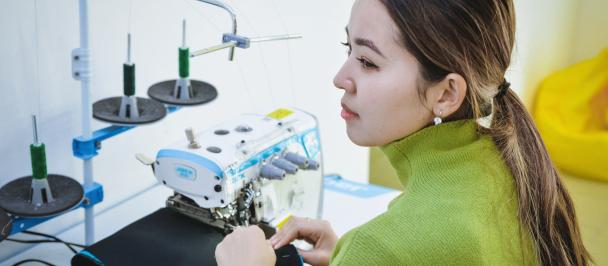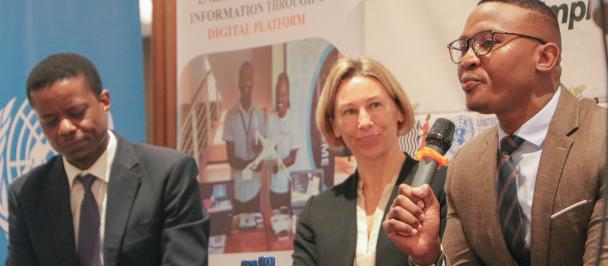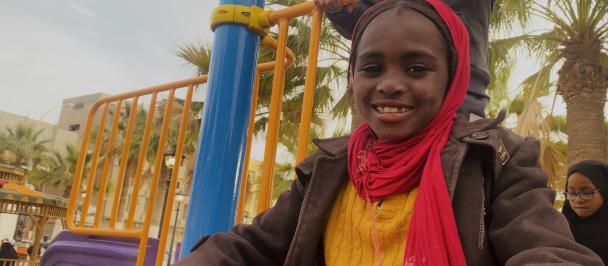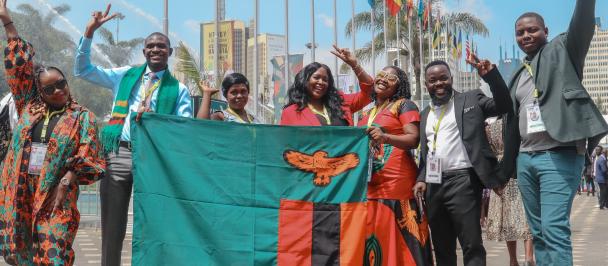UNDP’s latest initiative to engage with youth includes a series of summer dialogues on their role in Ukraine’s humanitarian and recovery responses
International Youth Day: Engaging young people in the rebuilding of Ukraine
August 12, 2022
A group of young people participate in UNDP-supported youth dialogues. Voznesensk, Mykolaiv Oblast, Ukraine, 15 July 2022.
Today, the world is home to the largest generation of youth in history – more than 1.8 billion young people who are more interconnected than ever before. Many are leading political, social and economic change in their communities.
The world observes International Youth Day on 12 August to highlight the potential of youth as equal partners in a modern global society. This year, the Day is commemorated under the theme of Intergenerational Solidarity, emphasizing youth participation as a key factor in achieving the Sustainable Development Goals (SDGs). This year’s theme in Ukraine is “Youth that Amaze,” demonstrating young people’s many contributions in overcoming the consequences of war through information, sports, education, culture and economics.
In Ukraine and around the world, the United Nations Development Programme (UNDP) supports the capacity development of young people and youth-led organizations, and the formation of youth caucuses in government, parliament and other official bodies. UNDP supports the mainstreaming of youth issues in development planning and in inter-ministerial and inter-sectorial coordination, and engages with relevant stakeholders through outreach, advocacy, thought leadership, global networks, and policy debates, particularly in the context of the post-2015 development agenda and the SDGs.
Since Ukraine’s independence from the Soviet Union in 1991, UNDP has always engaged with youth, encouraging, empowering and equipping them to actively participate in the development of their country. Since February 2022, however, millions of young people have been forced to leave their homes in search of security in different regions of the country and abroad. Despite the challenges, many young people play an active role in the emergency response, serving as volunteers in their communities, helping distribute humanitarian aid and supporting internally displaced people (IDPs) and vulnerable populations.
Recognizing the need to ramp up the inclusion of young people in Ukraine’s recovery process, the NGO Youth Platform and the Ukrainian Association of Youth Councils have organized a series of dialogues on the role of youth in the humanitarian response and further recovery of Ukraine. The dialogues, supported by the UNDP and in cooperation with the Ministry of Youth and Sports of Ukraine, have been taking place during the summer of 2022.
Manal Fouani, interim UNDP Resident Representative in Ukraine, said the intention behind the dialogues is to create a space for sharing experiences and discussing the role of young people in humanitarian and recovery efforts. “Their ideas and proposals for resilience building and sustainable recovery should not just be collected, but implemented with their active involvement,” she said. “Uniting and empowering young people to play an active role in reconstructing their country is the best way to build forward better in a way that leaves no one behind.”
Maryna Potapenko, Deputy Minister of Youth and Sports of Ukraine, said as the war continues, “we actively call for the support for youth participation and initiatives. Because it is not only an opportunity to improve life in communities but also to unite young people around the issue of helping others and rebuilding the country.”
Demian Petryk, project manager at the NGO Youth Platform said young people are defending the independence of Ukraine on all fronts – militarily, with humanitarian response efforts and online to counter misinformation. “Despite the challenges of war, many young people continue to support and strengthen their communities in any way they can,” he said. “Their efforts and their voices are critical to the future of Ukraine.”
To date, 20 dialogues have taken place with the participation of 370 young girls and boys from 21 communities throughout Ukraine. Due to the high interest of youth councils in participating in the project, several more sessions are planned to be held in August and September.
The dialogue participants have proposed 49 ideas for possible initiatives at the community level, some of which will be implemented with the support of UNDP, the European Union, and the Ministry of Foreign Affairs of Denmark. The youth councils that facilitated the dialogues will be able to join a competition to work with the proposed initiatives aiming to motivate young people to continue to be active and not to stop in their initiatives.
Once the dialogue process is finalized, the comprehensive results and recommendations on opportunities for increased meaningful engagement of young people will be developed and presented to the Government of Ukraine.
Early outcomes of dialogues
Initial results indicate an ongoing need for increased knowledge and skills among young people in the provision of first aid and learning how to deal with people in distress.
The youth have also expressed interest in accessing funding and opportunities to implement initiatives at the local level. Dialogue participants have noted the need for more spaces, networks, and platforms to facilitate connections and cooperation with youth across the country – and with youth from other countries. They also have called for greater youth employment programmes and vocational training opportunities as a way to respond to and help alleviate the dire economic situation.
Some participants said they missed a format like dialogues and added that the event helped them remember how important it is to communicate and develop ideas together because the more opinions, the better the opportunity to think about an idea from different perspectives. Other participants voiced that the dialogues have already affected the activities in the communities where they were held.
Tetiana Deriabkina, project participant, Head of the Secretariat of the Youth Council at the Dnipropetrovsk Oblast Civil-Military Administration, said the dialogues are providing an impetus to return to work with young people. “Immediately after one dialogue, we met with the youth council and planned work in the field of youth policy in the region to develop civic participation of young people and help them adapt to new social realities,” she said.
Background
Working closely with the Ministry of Youth and Sports of Ukraine, UNDP helps young Ukrainians acquire valuable knowledge and skills so they can contribute directly to the implementation of socially important initiatives and innovative projects aimed at improving human rights and promoting democracy at the community level.
Starting in 2014, UNDP has overseen a number of projects in eastern Ukraine (Donetsk and Luhansk oblasts) that empower and engage youth. One such initiative, designed in cooperation with the Ministry of Youth and Sports of Ukraine and the State Institute of Family and Youth Policy is the ‘Youth Worker’ platform for joint training, communication and support of professionals working with youth in public and civic sectors.
UNDP has been running a specialized course since 2018 called ‘Civic Education for Youth Workers’, promoting a comprehensive understanding of the links between human rights and democratic principles and mechanisms. The training also seeks to inspire interest in social processes and the ability to critically evaluate them, as well as how to be drivers of effective change in their communities.
In 2021, the Ministry of Youth launched the State Target Social Programme ‘Youth of Ukraine’ for 2021-2025 with the support of the UNDP, putting youth participation at the centre of youth policy implementation at all levels. To measure and evaluate programme effectiveness, UNDP worked with the ministry to develop a simple and clear tool – the Youth Participation Assessment Index –to evaluate youth policy measures and interpret their results to the general public.
Of the 39 UNDP projects providing grants to promote social cohesion in 2021, 17 were implemented by youth organizations, and 22 included projects with youth as main beneficiaries. During the previous year (2020), six of 25 projects were implemented by youth, and 19 of the total had youth as main beneficiaries.
Before the Russian invasion, more than 300 youth centres and spaces were operating across Ukraine, bolstering youth participation and civic activism – many of them set up and supported by UNDP. Many of these centres have now become hubs for humanitarian assistance or shelters for some of Ukraine's more than 6.6 million internally displaced people. As of June 2022, 23 youth infrastructure facilities belonging to the youth centres and spaces have been damaged or destroyed, and 59 of them are now occupied. In a recent survey among youth workers in Ukraine, 37.6 percent said they are still fully able to perform their duties; 51 percent said they are only partly able to, while 10.8 percent report being unable to work at all.

 Locations
Locations